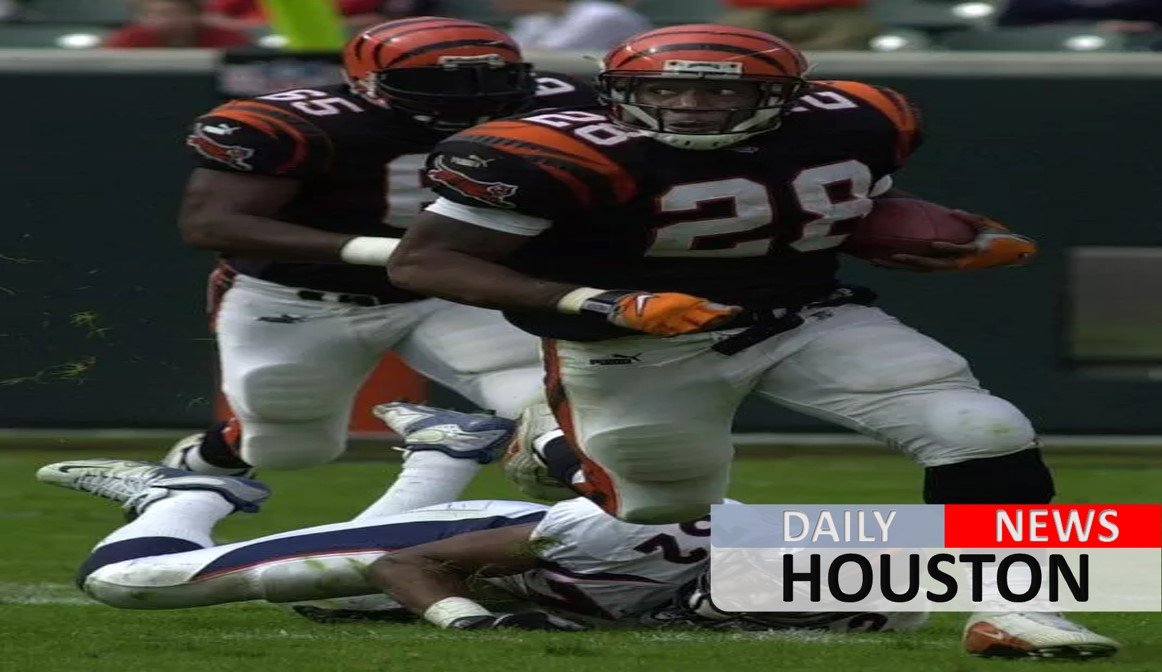Corey Dillon made a career of leaving wreckage in his wake.
He left the Denver Broncos bruised and embarrassed during his 22-carry, 278-yard, then-NFL record rushing day in 2000. A string of opponents suffered his tenacious running style racking up six consecutive 1,100-yard seasons for the Bengals from 1997-2002.
Yet, Dillon’s notorious claim he’d rather “flip burgers” than return to the team in 2000 and stating he wanted out in 2003 left scars on Bengals management before eventually being dealt to New England.
He’d win a Super Bowl during his greatest season with the Patriots in 2004 and career numbers should place him in more Hall of Fame conversations.
Still, the path to his ultimate moment in the league was tattered thanks to a rocky means to his Cincinnati end.
Dillon, 42, can see that now. He’s never made contact with the Bengals – nor vice versa – about a return to Paul Brown Stadium or opportunity to mend fences.
Until now.
As one of the top 50 players in Bengals history the team reached out to invite him back to be honored during a game, as is the case with 49 others. For him, the opportunity presents an ideal opportunity to repair the most significant carnage left behind during his career.
“I am a grown man, I can admit when I’m wrong,” Dillon said. “I did some stuff that was not cool, OK? Not cool at all. But, hey, at the end of the day I got the end result that I wanted. That was to play on a stage and actually winning a Super Bowl. Do I wish it would have been with them? Absolutely. Absolutely. It didn’t work out that way. I don’t have no ill will toward nobody there.”
For anyone expecting a grudge, you won’t find one at Dillon’s home in Los Angeles. All you’ll find is a man content in his anonymity and only concerned with finally breaking 80 on the golf course he plays nearly every day.
He’s been retired from the NFL for 10 years now. As in-your-face as Dillon was as a player, he took the opposite approach after football.
Dillon hasn’t talked about his polarizing career in Cincinnati. In fact, outside of being tracked down by a tenacious TMZ reporter, even a Google search yields few signs of his whereabouts the last decade. But in speaking with The Enquirer last week for the Bengals Beat Podcast, he felt ready to be heard yet again. Only this time, the mature Dillon played the role of peacemaker rather than bully.
“They say time heals wounds,” Dillon said. “I played seven years hard for the Bengals. I’m a part of their history. They are a part of mine. I don’t dwell on the past. What happened in the past is done. If I had a magic wand to go undo some stuff I would, but I can’t. But that doesn’t mean we can’t move forward and have a better relationship. That’s how I look at it. I appreciate it for them giving me a call and inviting me back. That means a lot.”
Dillon’s more than part of their history, he’s at the forefront of their record books. His 246 rushing yards as a rookie against the Tenessee Oilers then set the NFL mark for most rushing yards in a game by a rookie. Four players topped the mark since led by Adrian Peterson in 2007, but Dillon still holds the top three individual rushing games in team history. His 278 against Denver tops the chart followed by 246 against Houston and 216 against Arizona in 2000.
He also owns the club record for career attempts (1,865), yards (8,061) and 100-yard games (28). He ranks 20th all-time in rushing yards (11,241), between Hall of Famers John Riggins and O.J. Simpson.
What makes Dillon’s records more impressive was during the six-year run in which he carried the load prior to Rudi Johnson taking over in 2003, here’s a list of quarterbacks handing him the ball: Boomer Esiason (his final season in the NFL), Neil O’Donnell, Scott Mitchell, Akili Smith, Gus Frerotte, Jon Kitna, Paul Justin.
On the day of Dillon’s greatest game and against one of the best defenses in football at the time, Smith and Mitchell combined to go 2 for 14 for 34 yards through the air.
Two. Fourteen. Thirty-four.
Dillon’s effort now ranks fourth all-time behind Peterson (30-296), Jamal Lewis (30-295) and Jerome Harrison (34-286). None of those three can boast the 12.6 yards per rush of that miraculous day at PBS.
“I take my record the way I broke it over theirs any day,” Dillon said. “That’s 22 carries. They took more carries, played worse defenses than I did and I stack my day up against theirs any day. They can have the record. That’s fine. The way I did it, I’ll take that over all of them.”
Dillon’s cleats, jersey and pants from the game went to the Hall of Fame and the Bengals gave him a plaque recognizing his effort.
That’s where a telling revelation in this tale emerges 17 years later. Dillon rolled up a career-high 1,635 yards and 12 touchdowns en route to powering the Patriots to the Super Bowl XXIX title. By far his most dominant season. He says his championship ring has only been taken out two or three times since and lives in the darkness of a safe somewhere.
The plaque from the Bengals, however, hangs prominently in his Los Angeles home.
“I clean that thing off every other day,” Dillon said. “That’s one of my favorite items that I have. It never gets old to me. Every time I go into my man cave and I look at it, it brings back that memory.”
That’s why the invitation to return as part of the Bengals 50 best players program means so much to Dillon. He looks back understanding the error in the ways of his youth and preferring to remember what went right in Cincinnati rather than what went wrong.
Perhaps time does heal all wounds. And for Dillon, it’s time.
“Whether you like me or not, the fact is I’m one of their top 50 players,” Dillon said. “I would love to come back and have everything smooth, nice and peachy. Absolutely. That’s a dream. Come back and everybody is understanding and we let bygones be bygones. I’ve been done with it. I’m over it. It’s been too long. I haven’t played in 10 years. Worrying about something that happened in 2003 is not on my list to deal with. Trust me.”









